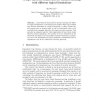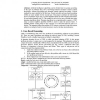450 search results - page 54 / 90 » Algorithmic uses of the Feferman-Vaught Theorem |
COCO
1994
Springer
14 years 27 days ago
1994
Springer
Recent results by Toda, Vinay, Damm, and Valiant have shown that the complexity of the determinant is characterized by the complexity of counting the number of accepting computati...
ASIAN
2006
Springer
14 years 16 days ago
2006
Springer
Abstract. A type-theoretic framework for formal reasoning with different logical foundations is introduced and studied. With logic-enriched type theories formulated in a logical fr...
KES
2004
Springer
14 years 2 months ago
2004
Springer
Artificial Intelligence algorithms can be divided into two groups according to the type of problems they solve. Knowledge-intensive domains contain explicit knowledge, whereas know...
STOC
2005
ACM
14 years 9 months ago
2005
ACM
A celebrated 1976 theorem of Aumann asserts that honest, rational Bayesian agents with common priors will never "agree to disagree": if their opinions about any topic ar...
ML
2000
ACM
13 years 8 months ago
2000
ACM
The naive Bayesian classifier provides a simple and effective approach to classifier learning, but its attribute independence assumption is often violated in the real world. A numb...


